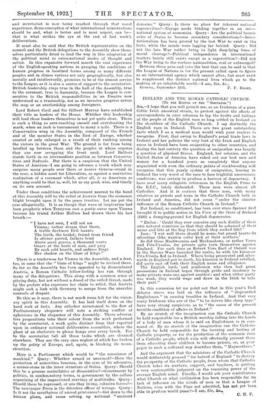IRELAND AND THE ROMAN CATHOLIC CHURCH.
[To THE EDITOR er THE " SPECTATOR."] Sra,—I hope that you will permit me, as an Irishman of a pure Celtic Irish ancestral strain, to protest against the efforts of correspondents in your columns to lay the faults and failings of tho people of the English race so long settled in Ireland on the shoulders of the Catholic Church. I say distinctly the English race in Ireland. There are two great outstanding facts which I as a medical man would wish your readers to recognize. First, that owing to England's penal trade laws in Ireland and her policies the very best of the Irish and English races in Ireland have been emigrating to other countries, and during the last century the question of emigration was largely a question of physical fitness. England, her colonies, and the United States of America have raked out our best men and women for a hundred years so completely that anyone acquainted with even the ordinary points of stockbreeding will recognize that this yearly system of emigration, leaving in Ireland the very worst of the race to face frightful uneconomic conditions, was certain to produce a harvest of degeneracy. I have read many eulogistic references in the English Press to the R.I.C., lately disbanded. These men were almost all Catholics. And it is curious that these men, with many relatives as priests and nuns in the Catholic Church both in Ireland and America, did not come " under the sinister influence of the Roman Catholic Church in Ireland."
But Ireland, so conditioned, has been ever since Spenser first brought it to public notice in his View of the State of Ireland (1595) a dumping-ground for English degenerates.
"Endon : Could they ever conceive any such dislike of their own natural countries as that they should be ashamed of their name and bite at the ?lug from which they sucked life? '
Iseu : 'I wot well there should be none; but proud hearts do oftentime (like wanton colts) kick at their mothers.'
So did these MaoSweenies and Mackmahons, or rather Veres and Fitz-Ursulas, for private spite turn themselves against England. For such time as Robert Vere Earl of Oxford was in the Barons Wars banished the realm, he with his kinsman Fitz-Ursula fled to Ireland. Where being prosecuted and after- wards in England put to death, his kinsmen in Ireland rebelled, did quite cast off both their English name and allegiance.
The English lords 'and gentlemen who then had great possessions •in Ireland. began through pride and insolency to make private wars one against another; and when either party was weak, they would wage and draw in the Irish to take their part."
In this connexion let me point out that in this year's Dail debates stress was laid on the influence of " disgruntled Englishmen " in causing troubles in Ireland. And that very many Irishmen who are of the " to be driven like sheep typo " have very strong suspicions as to " the cause of the present terrible condition of affairs in Ireland."
By no stretch of the imagination can the Catholic Church be held responsible for a British warship falling into the hands of a body of men whom it is said an Englishman is in com- mand of. By no stretch of the imagination can the Catholic Church be held responsible for the burning and looting of Catholic property, or for the production of the economic ruin of a Catholic people, which ruin will effectually prevent them from educating their children to become priests, or, as your paper in such a cultured way describes them, "Maynoothers."
And the argument that the ministers of the Catholic Church would deliberately proceed " for hatred of England " to destroy the prosperity of the Catholic people, from whore that Catholic Church takes its nurture, support, and teachers, is putting a very contemptible judgment on the reasoning power of the average English mind. Finally, I would ask your contributors what Church or what civilization has been responsible for its lack of influence on the minds of men so that a. League of Nations, even with the Pope not admitted, has not yet been able to produce world peace P—I am, Sir, &o.g
C. H. F.


































 Previous page
Previous page